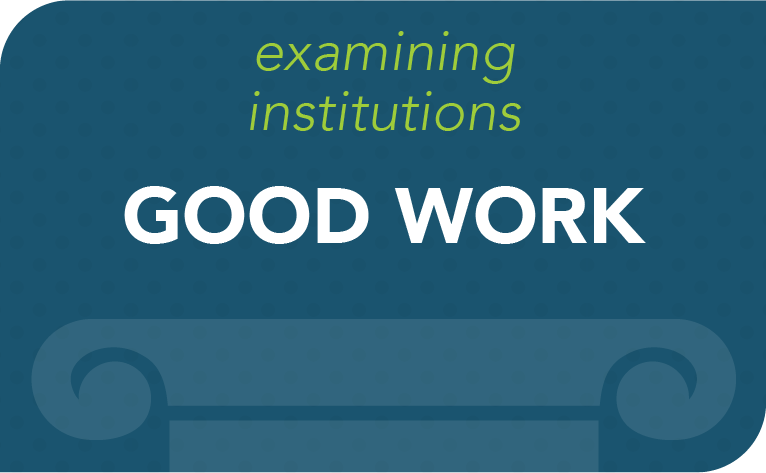
What is Higher Education?
October 2021
by Jennifer Frey
Associate Professor of Philosophy
University of South Carolina
In virtue of what are universities institutions of higher education? Surely it means more than higher in the number of years in school, more than higher in its demands on student attention and effort, and it certainly ought to mean more than higher in its costs, financial or otherwise. I would hope that a university education is higher in its aspirations and goals, which raises the philosophical question: What is a university education for?
There used to be a distinction that signaled the difference between learning for the sake of acquiring knowledgeable skills (a trade or work) and learning for its own sake, and that was the distinction between the liberal and the servile arts. For example, Aquinas, in his commentary on Aristotle’s Metaphysics (a text that begins with a discourse on wonder and the value of pursuing knowledge for its own sake), he calls liberal or free those arts which are concerned with knowledge for its own sake, and servile those arts which are concerned with utility, where the knowledge learned is for the sake of some already determined end. This distinction has been lost to contemporary discourse, and to the detriment of our understanding of higher education.
The servile arts are necessary and important for human society—we need bright men and women dedicated to practical works like designing and building bridges and running businesses—but we must not lose sight of the fact that such activities are not good in themselves. Bridges are good insofar as they help us cross bodies of water; business is good for profits and the production of goods. But what is instrumentally valuable in human life and society is ultimately in service of what is highest or ultimately choiceworthy. Intrinsically valuable goods go beyond the needs of life; they are what we aim at when those needs have been satisfied, such as knowledge, beauty, and friendship.
Of course, there are different kinds of knowledge, and skilled trades are one form of practical, domain specific knowledge. But classical philosophy recognized that knowledge isn’t merely useful or practical, it can and must be pursued for its own sake as a common end in a community of scholars. Such knowledge is good without qualification because it contributes to human flourishing—it fulfills the natural, human desire we have to know and understand reality that so impressed Aristotle in the opening of the Metaphysics and Plato in his dialogue Gorgias and Symposium.
Even further, the pursuit of knowledge is essential to cultivating the interior freedom that is the foundation of moral and political life. In order to live well (and not merely work well) we must take the pursuit of truth seriously, because truth is the measure of knowledge, and knowledge of what is true and good are the ultimate basis of practical wisdom and other intellectual virtues, and these virtues are necessary for good practical deliberation in the political and domestic spheres.
An education predicated primarily on the instrumental value of work is sorely lacking, for mere instrumentality has no deeper meaning, purpose, or value. If we acquire all the necessities of life—health, infrastructure, consumer goods—we are still left with the question: what are we living for? What makes for a good life and a good society? If we have no answer to these questions, then we do not know what life’s necessities are meant to secure for us. If all we have is usefulness, we have carved out for ourselves an empty and vain existence.
If we want more than a futile life of work, then we need to understand what our leisure is for, what our money is for, what our power is for. And here we do well to remember that the original Greek term for leisure is school, and that a proper education makes us free in a deep and important sense: free to live well apart from the specialized demands of work.
A technocratic approach to higher education understands it as a training for a life of work. While such an education will always have its place in human society, a university education cannot be reduced to this and remain higher in any deep sense. A university education must always be focused on what is higher than the space of mere utility. In its essence, higher education concerns the cultivation of the human mind so that students can become free: free to inquire and to come to know what is true, including what is truly good to pursue, so that they can live well and contribute to a flourishing human society. A technocratic education severs the link between knowledge and virtue; a truly higher education does not.





